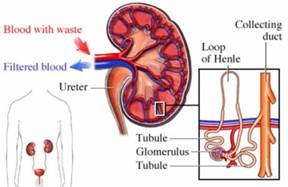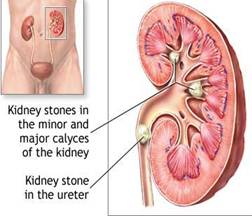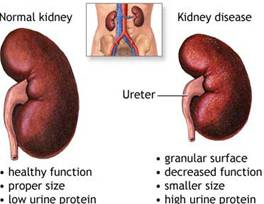KIDNEY DISEASE
The urinary system is made up of the kidneys, the ureters, the bladder, and the urethra. The kidneys are the organs that get rid of our body waste in the form of urine. There are two kidneys, one on either side of the spine under the lower ribs. The ureter carry the urine from the kidneys to the bladder. Urine is stored in the urinary bladder until urination occurs. It passes out of the body through a tube called the urethra.

KIDNEY STONES
KIDNEY FAILURE
KIDNEY STONES
Top
Stones can form anywhere in the urinary system. They develop when certain chemicals in the urine form crystals that stick together. The crystals grow into a stone, which can range in size from a grain of sand to a golf ball. Small stones can pass through the urinary system without causing too much problems. However, larger stones can block the flow of urine or irritate the lining of the urinary tract. Most stones (70 to 80 percent) contains calcium oxalate crystals. A smaller number of stones are made of uric acid or cystine.

Causes
Normally, urine contains chemicals, which prevent crystals from forming. Some people seem to be more prone to kidney stones than others. Factors such as recurrent urinary tract infections, drinking less fluids and blockage of the urinary tract lead to stone formation. Consuming too much calcium oxalate or uric acid in the diet, excess vitamin C or D, certain medications and metabolic diseases may also lead to development of kidney stones.
Symptoms
Kidney stones may remain without any symptoms for a long time. They may present with episodes of severe pain that usually starts suddenly in the lower back under the ribs or in the lower abdomen, and moves to the groin. The pain which is often associated with vomiting may last for minutes or hours, followed by periods of relief. The stones may cause blood to appear in the urine. If there is associated urinary tract infection, there may be burning during urination, urge to urinate.
Diagnosis
A complete medical examination, X-rays and other tests are required to diagnose kidney stones. The doctor will conduct a complete physical examination and ask questions about past kidney illness, diet, use of medications and family background. A plain X-ray of the abdomen including the kidneys, ureters and bladder region (KUB view) shows most stones as they are opaque to X-rays. Some less common stones can be seen using dye injections (Intravenous Pyelography) or an ultrasound test. Blood tests like calcium, phosphorus and uric acid estimation and urine tests may be needed to find out if there is an underlying cause.
Treatment
Most small stones usually pass through the body by themselves within hours or a few days. Drinking lots of fluids helps this process.
Certain types of stones can be dissolved using medications. However, the most common stones (those containing calcium) cannot be dissolved. Stones that do not pass by themselves need treatment. One method of treatment is a non-surgical technique called Extra-corporeal Shock Wave Lithotripsy (ESWL) that uses high-energy shock waves to break the stones into small fragments like sand. This stone dust then passes with urine during the next few weeks.
This treatment can be successfully used in many cases where the stones are relatively small. The other method is by an operation that can be done either using the endoscope (ureteroscopy, nephroscopy) or by the standard open technique. More and more stones can now be treated without having to resort to an open operation.
Complications
Besides causing recurrent episodes of severe pain, kidney stones can cause bleeding along with urine. Infection may occur that may affect the kidneys. If the stones blocks the downward flow of urine, the kidney swells up with urine (hydronephrosis) that can over years adversely affect its function.
Prevention
Certain precautions can be taken to help prevent the formation of kidney stones. If there are no underlying health problems, the most important thing is to drink plenty of water every day so that the volume of urine passed per day is between 2 to 4 litres. An adequate intake of water must be maintained throughout the day especially along with meals and after exercise. In case of calcium oxalate stones, very large amounts of dairy products or foods high in oxalates (like tea or chocolate) should not be consumed. Red meat must be restricted in cases of uric acid stones.
KIDNEY FAILURE
Top
The main function of the kidneys is to eliminate excess fluid and waste material from the blood. When the kidneys lose this filtering ability, dangerous levels of fluid and waste accumulate in the body leading to a condition known as kidney or renal failure. This may be due to various factors including infections, autoimmune diseases, and other endocrine disorders, cancer, and toxic chemicals. Kidney failure usually occurs in the late stages of the disease processes. Once kidney failure occurs, it requires immediate management and even then prognosis is often not satisfactory unless kidney transplantation is done.

Causes
There are two main types of kidney failure:
ACUTE RENAL FAILURE (ARF)
Top
This is characterized by a sudden impairment of renal function marked by rapid, and steadily increasing accumulation of toxic products in the blood, normally excreted by the kidneys. The causes of acute kidney failure include:
-
Factors that interfere with renal blood flow (for example: fluid and electrolyte depletion, haemorrhage, severe infections, cardiac or liver failure, heat stroke, fluid depletion due to burns).
-
Factors that cause obstruction (for example enlarged prostate and kidney stones can also lead to acute kidney failure).
-
Other causes are factors that impair the renal function directly (for example acute tubular injury or acute glomerulonephritis, which is an inflammatory disorder of the kidney).
CHRONIC RENAL FAILURE (CRF)
Top
This is characterized by a slow and irreversible impairment of the excretory and regulatory functions of the kidneys. The causes of CRF include:
-
Chronic disease of the kidneys like glomerulonephritis
-
Chronic infection like tuberculosis
-
Anomalies of the kidneys that are present since birth
-
Vascular disease like hypertension
-
Endocrine disease like diabetes
-
Obstructive processes in the kidneys such as kidney stones
-
Nephrotoxins (toxic chemicals that affect the kidneys)
Symptoms
The symptoms and signs of kidney failure depend upon the type of failure. In acute kidney failure, the patient may have oliguria (reduced urine output) along with generalised swelling (oedema) of the body together with high blood pressure. Sometimes there may be blood in the urine.
In the early stages of chronic kidney failure, the patient may merely have increasing fatigue and tiredness and symptoms like nocturia (increased frequency of urination at night). Vomiting, oedema and high blood pressure eventually develop. There is also loss of appetite. Other symptoms depend upon the cause of the failure. For example, if there are kidney stones, then there may be excruciating groin pain or if there is severe haemorrhage or diarrhoea there may be signs of shock.
Complications in renal failure include pulmonary oedema (presence of fluid in the lungs), severe sustained increase in blood pressure, acidosis, hyperkalaemia (increased level of potassium in the blood), and infection. If untreated, the last stage of kidney failure is almost invariably fatal.
Diagnosis
Urine examination is done to determine the presence of protein, sugar, casts and crystals, pH and specific gravity and the quantity of sodium. This gives an idea as to the cause of the failure. Blood tests include tests of renal function like
Blood counts and the haemoglobin levels are also useful. An ultrasound of the abdomen or a CT-scan needs to be taken to assess kidney size with grossly shrunken kidneys indicating a more advanced disease. End-stage renal disease is diagnosed when blood tests consistently show very high levels of urea and creatinine, a sign that kidney function has been severely and permanently damaged.
Treatment
In acute kidney failure, general treatment measures include avoiding drugs that require renal excretion, balancing fluid intake with output, high carbohydrate and low-protein diet, essential amino acid replacement and at least 100gms of glucose per day, decreased intake of salt and potassium, vitamin supplements, prevention of injury or infection, weight management, electrolytes monitoring, and monitoring of vital signs, cardiac status, and mental status.
Peritoneal or haemodialysis is the treatment of choice when other measures fail. Drugs are used to reduce the blood pressure; diuretics (drugs that increase urine output) are used in some cases to increase blood flow unless oliguria is present. Antibiotics may be needed to treat associated infections (predominantly only antibiotics excreted by the liver are used if there is no liver disease).
In chronic kidney failure, general treatment measures include a diet low in sodium, potassium, and phosphate, but high in calories and supplemented with essential amino acids. Other measures include balanced fluid intake, and monitoring weight changes, vital signs, electrolyte balance, cardiac and mental status.
-
Drug therapy: This includes antihypertensives for hypertension, diuretics for oedema and hypertension, phosphate binders for hyperphosphataemia (increased phosphate levels in the body), antibiotics, anticonvulsants for seizures, antiemetics (drugs that prevent vomiting) for nausea, laxatives for constipation, calcium, iron, and vitamin supplements.
-
Dialysis: Peritoneal dialysis or haemodialysis is often required for end-stage disease.
-
Surgery: Kidney transplantation is the solution for several patients as dialysis is often a measure that cannot be done indefinitely. The results of transplantation are now extremely good with substantial five-year survival rates.
Prevention
Prevention of the causative factors, wherever possible, may help in preventing the development of the disease. Control of blood sugar in diabetics is of great importance. After the disease has developed, drug therapy may help and dialysis and kidney transplantation are increasingly being performed with excellent results. Control of blood pressure and avoiding smoking, alcohol, and drug abuse are also necessary. Proper diet and exercise also help in delaying the progress of the disease
Source
http://doctor.ndtv.com/topicsh/Kidney%20failure.asp
http://doctor.ndtv.com/topicsh/Kidney%20stones.asp
http://services.epnet.com/getimage.aspx?imageiid=6217
http://apps.uwhealth.org/health/adam/graphics/images/en/17091.jpg
http://graphics8.nytimes.com/images/2007/08/01/health/adam/19713.jpg |



